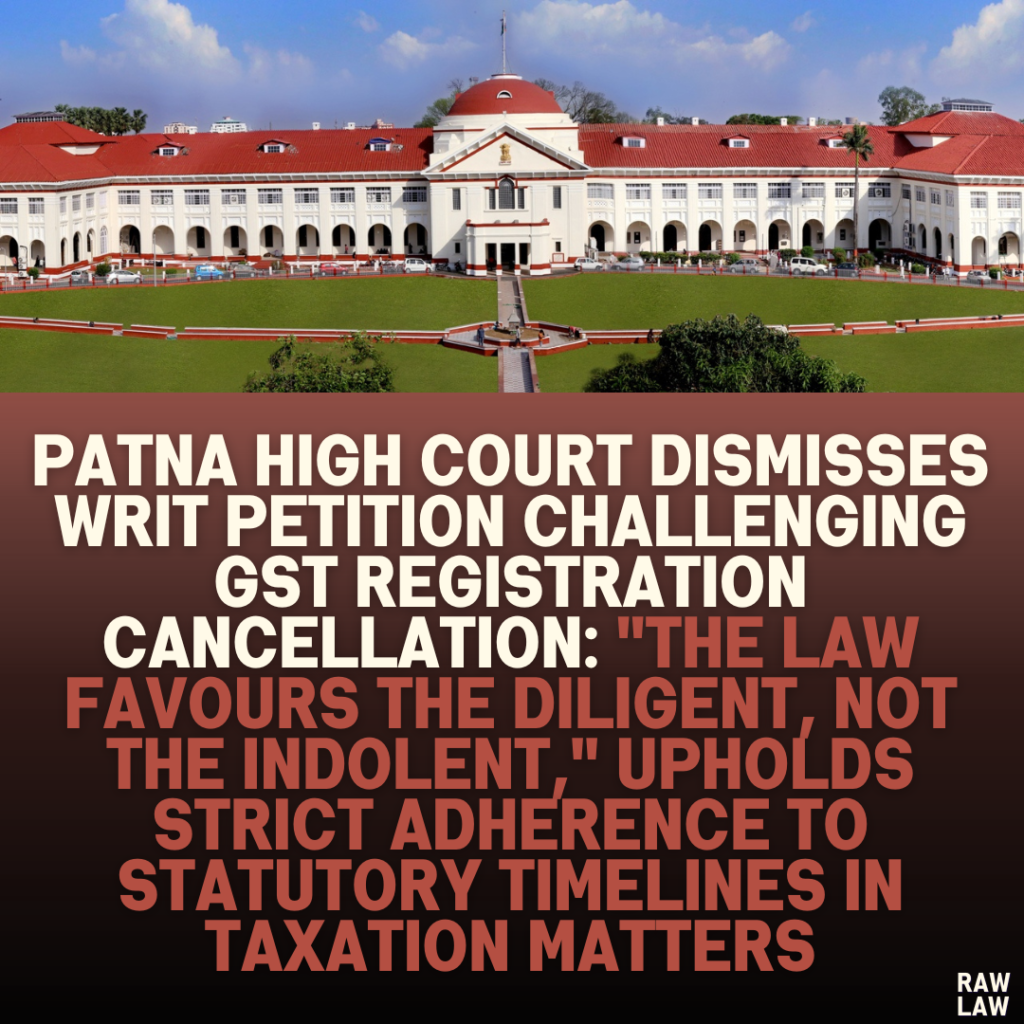Court’s Decision
The Patna High Court dismissed the writ petition filed by the petitioner challenging the cancellation of their GST registration. The court held that the appeal against the cancellation was filed with an inordinate delay, far beyond the prescribed statutory timeline. The bench remarked, “The law favours the diligent, not the indolent,” emphasizing that procedural delays cannot be condoned without sufficient justification.
Facts
- The petitioner, a GST-registered dealer, received a show-cause notice on March 2, 2023, for failure to file mandatory GST returns.
- Subsequently, the petitioner’s GST registration was cancelled on July 10, 2023, via an order by the competent authority.
- Under the BGST Act, an appeal against such cancellation must be filed within three months of the order, with a possible one-month extension for delay condonation.
- The petitioner did not file the appeal until September 23, 2024, which was well beyond the maximum permissible period of four months.
- During the intervening period, the petitioner failed to demonstrate any compliance with GST return requirements or challenge the show-cause notice allegations.
Issues
- Timeliness of the Appeal: Whether the petitioner’s delayed appeal could be condoned under the provisions of the BGST Act.
- Availability of Writ Jurisdiction: Whether the petitioner could invoke writ jurisdiction despite failing to exhaust statutory remedies within the prescribed timeframe.
Petitioner’s Arguments
- The petitioner contended that the cancellation of their GST registration severely hampered their ability to conduct business.
- No explanation was provided for the significant delay in filing the appeal.
- The petitioner admitted to failing to file GST returns but sought leniency and reinstatement of registration on equitable grounds.
Respondent’s Arguments
- The respondents argued that the petitioner’s failure to file GST returns justified the cancellation of registration.
- They emphasized that Section 107(4) of the BGST Act explicitly provides a time limit of three months for appeals, extendable by only one additional month, which was grossly exceeded in this case.
- The respondents submitted that entertaining the writ petition after such delay would undermine the statutory framework and encourage non-compliance.
Analysis of the Law
- Statutory Timelines:
- Section 107(4) of the BGST Act requires appeals against cancellation orders to be filed within three months.
- A one-month extension for condonation of delay is permissible but only under exceptional circumstances. The petitioner failed to meet either deadline.
- Judicial Precedents on Timeliness:
- Courts have consistently held that statutory timelines must be respected, particularly in taxation matters where compliance ensures uniformity and order.
- Procedural delays without sufficient justification do not warrant judicial intervention.
- Impact of Non-Compliance:
- The petitioner’s non-compliance with GST return filings during the relevant period further validated the cancellation order.
- The lack of any evidence of business activity or remedial action by the petitioner demonstrated negligence.
Precedent Analysis
The court relied on established principles that discretionary relief under writ jurisdiction cannot be extended to parties who neglect statutory obligations. It reiterated that such relief is reserved for exceptional circumstances where procedural violations result from unavoidable factors.
Court’s Reasoning
- Delay in Filing Appeal:
- The petitioner filed the appeal almost a year beyond the permissible period.
- No satisfactory explanation or compelling justification was provided for the delay.
- Failure to Comply with GST Requirements:
- The petitioner admitted to not filing returns for the prescribed period, a key requirement under the GST framework.
- The petitioner’s activities during the intervening period were not monitored due to the lapse in registration, creating uncertainty about potential violations.
- Judicial Discretion:
- The court declined to exercise its discretion to condone such inordinate delay, underscoring the principle that procedural compliance is integral to the legal system.
- The bench remarked, “The law favours the diligent, not the indolent,” highlighting the importance of timely action by litigants.
Conclusion
The court dismissed the writ petition, holding that:
- The petitioner’s delay in filing the appeal was inexcusable.
- The cancellation order was justified based on the petitioner’s non-compliance with GST requirements.
- No grounds were found to warrant judicial intervention or relief.
Implications
- Strict Adherence to Timelines:
- The judgment reinforces the necessity of adhering to statutory timelines, particularly in taxation matters.
- Taxpayers must act diligently to avoid losing their rights to challenge adverse orders.
- Limited Scope of Writ Jurisdiction:
- The ruling underscores that writ jurisdiction is not a substitute for statutory remedies.
- Courts will not entertain petitions filed as a last resort after procedural lapses.
- Compliance Culture in Taxation:
- By upholding the cancellation of registration, the court sends a strong message about the importance of compliance with GST regulations.
This judgment serves as a cautionary tale for taxpayers, emphasizing the need to respect procedural requirements and act proactively in defending their legal rights.




Pingback: Bombay High Court Acquits Driver in Fatal Highway Accident Case, Citing Lack of Evidence for Rash or Negligent Driving - Raw Law